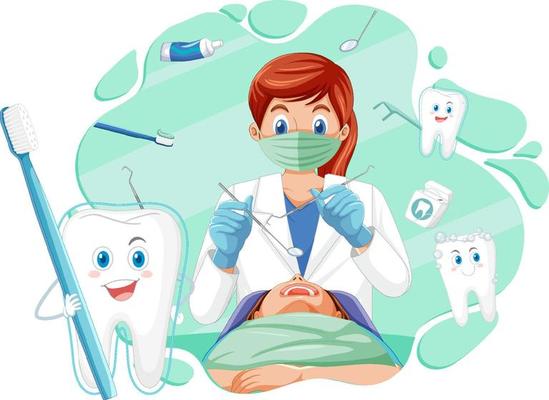Learn More About Regular Dental Issues Your Dentist Can Settle
Understanding frequent dental concerns is essential for preserving ideal dental wellness. Problems such as dental caries, gum condition, tooth level of sensitivity, halitosis, and dental cavity prevail yet usually neglected until they become severe. Dental professionals possess the competence to diagnose and deal with these problems, consequently preventing more problems. Routine oral sees and customized treatment plans can attend to these problems properly, ensuring a healthier and brighter smile. Yet what specific therapies do dental professionals use to deal with these issues, and exactly how can early intervention make a difference? The response to these inquiries provide important insights right into safeguarding your dental health.
Tooth Cavities
Tooth cavities, also recognized as cavities, are a common oral wellness concern caused by the demineralization of tooth enamel because of acid manufacturing from microbial plaque. This procedure begins when germs in the mouth metabolize sugars and starches from food, producing acids that erode the enamel. If not addressed without delay, this erosion can penetrate much deeper into the tooth, affecting the dentin and at some point the pulp, potentially resulting in extreme discomfort and infection.
The beginning of tooth cavity development often present as white places on the tooth surface area, suggesting preliminary demineralization. As the procedure proceeds, these spots can become brownish or black lesions, indicating a lot more considerable decay. Regular dental check-ups are important for very early detection, as dental caries in their nascent stages can be treated with remineralization strategies, such as fluoride treatments.
When a dental caries has actually developed, restorative intervention is needed. Dental experts commonly eliminate the decayed portion of the tooth and load the dental caries with products such as composite material, amalgam, or ceramic. In more severe situations, a crown or root canal treatment might be called for. Precautionary steps, consisting of great dental hygiene methods and dietary alterations, play a crucial function in mitigating the threat of cavities.
Periodontal Illness
While cavities stand for a considerable issue for oral health and wellness, one more crucial problem that requires focus is gum tissue condition. Likewise referred to as gum illness, gum illness is an inflammatory condition impacting the tissues surrounding and sustaining the teeth. It is largely brought on by the build-up of plaque-- a sticky movie of bacteria that forms on teeth.
Gum disease progresses with stages, starting with gingivitis, identified by redness, swelling, and bleeding gums (eugene dentist). If left untreated, gingivitis can rise to periodontitis, where the internal layer of the gum tissue and bone pull away from the teeth, creating pockets that end up being contaminated. In time, the contaminants produced by the microorganisms break down the bone and connective cells that hold teeth in position, potentially bring about missing teeth
Very early detection and treatment are essential. Specialist oral cleanings and enhanced dental hygiene practices, such as cleaning two times day-to-day and flossing, can handle gingivitis. For more innovative stages, therapies might include scaling and root planing, antibiotics, and even surgical interventions.
Regular dental check-ups play an essential role in taking care of and protecting against gum disease. Dental professionals can determine early indications and suggest ideal interventions, ensuring the upkeep of healthy periodontals and general dental health and wellness.
Tooth Sensitivity
Tooth sensitivity influences numerous individuals worldwide, presenting a typical yet frequently traumatic oral issue. This condition develops when the enamel, the outer protective layer of the teeth, is compromised, disclosing the underlying dentin. The dentin includes microscopic tubules that lead directly to the oral pulp, where nerves live. When exposed to stimulations such as warm, chilly, pleasant, or acidic materials, these nerves are triggered, causing sharp pain or discomfort.
Several factors add to enamel erosion and subsequent tooth level of sensitivity, including hostile brushing, acidic foods and beverages, gum tissue economic crisis, and bruxism (teeth grinding) In addition, dental treatments such as teeth bleaching can briefly heighten sensitivity.
Halitosis
One more widespread oral problem that affects individuals' every day lives is poor breath, clinically called halitosis. This problem can be especially traumatic, influencing individual communications and self-confidence. discover this Bad breath commonly originates from bad oral hygiene, which enables food bits to remain in the mouth, promoting microbial growth. These microorganisms generate sulfur substances, causing undesirable smells.

Suggestions might include boosting oral health techniques, such as regular brushing and flossing, utilizing anti-bacterial mouthwashes, remaining hydrated, and dealing with any kind of dental issues. Effective management of halitosis not just enhances oral wellness but additionally dramatically improves quality of life.
Tooth Decay

Preventing dental caries involves a combination of good dental health practices and normal dental check-ups. Cleaning teeth at the very least twice daily with fluoride tooth paste, flossing to eliminate plaque in between teeth, and limiting the intake of sweet foods and beverages are important precautionary steps. Fluoride therapies, dental sealers, and specialist cleanings supplied by a dentist can likewise play a significant function in fortifying enamel and protecting against decay.
When tooth decay takes place, very early treatment is key. Dental professionals can eliminate decayed tissue and bring back the tooth with fillings made from products such as composite resin, amalgam, or porcelain. In advanced cases, therapies like crowns, root canals, or removals may be needed. By attending to tooth decay immediately, dentists help protect dental framework and function, making sure long-lasting oral health.
Verdict
Dealing with usual dental concerns such as dental caries, gum illness, tooth level of sensitivity, foul breath, and tooth degeneration is essential for preserving ideal oral health and wellness and overall well-being. Dental experts possess the know-how to detect and deal with these problems properly, ensuring tailored take care of each person. Normal dental check-ups and safety nets are necessary in recognizing and managing these worries early, advertising a healthier and much more certain smile over a lifetime.

Tooth degeneration, likewise recognized as dental cavities, takes place when the enamel, the outermost layer of the tooth, is eroded by acids created by germs in the mouth. Cleaning teeth at the very least two times daily with fluoride toothpaste, flossing to get rid of plaque in between teeth, and restricting the intake of sugary foods and drinks are necessary precautionary procedures.Addressing typical oral concerns such as dental caries, gum condition, tooth level of sensitivity, bad breath, and tooth degeneration is important for keeping optimum oral wellness and overall wellness.